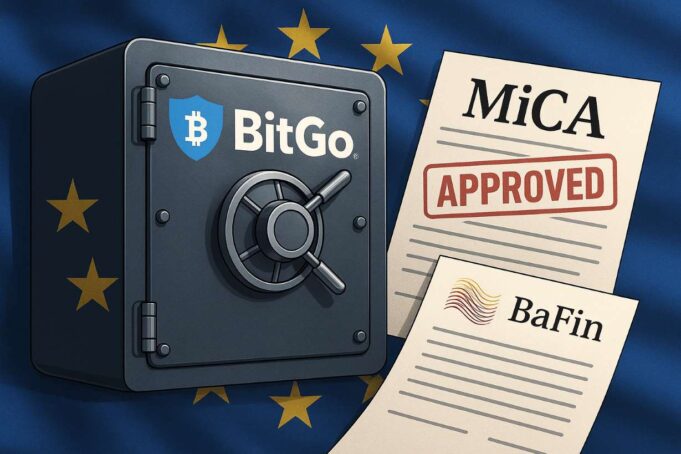BitGo has secured a landmark license from Germany’s BaFin under the European Union’s Markets in Crypto-Assets Regulation (MiCA). It will be one of the first crypto custodians officially authorized to operate under the bloc’s new regulatory framework. The license enables BitGo to provide secure digital asset custody services across the EU, offering a compliant infrastructure backbone as MiCA begins to reshape the regulatory landscape for digital assets in Europe.
Regulatory Milestone Under MiCA
According to company statements, U.S.-based digital asset custody firm BitGo has received formal approval from the German Federal Financial Supervisory Authority (BaFin) to operate under the MiCA regime. The license authorizes BitGo to offer crypto custody and wallet services across all EU member states. Thanks to MiCA’s “passporting” mechanism, firms licensed in one EU country can operate across the entire bloc.
Germany as a Strategic Base
Germany, known for its stringent financial oversight and early adoption of crypto regulation, is among the first EU countries to begin implementing MiCA. BitGo’s selection of Germany as its regulatory base underscores the country’s importance in setting standards for crypto compliance in Europe. The firm had already established its European headquarters in Frankfurt in 2023 to prepare for the coming regulatory shift.
Serving a Broad Range of Clients
The MiCA license allows BitGo to serve a broad range of clients, including crypto-native businesses, traditional financial institutions, and fintech firms seeking secure and compliant digital asset custody solutions. BitGo joins a short list of crypto firms — including Bitpanda, Crypto.com, and OKX — cleared by regulators under MiCA so far.
Institutional Trust and Market Advantage
BitGo’s regulatory approval comes as the MiCA framework nears full implementation across the EU, with phased requirements taking effect through 2024 and 2025. The framework introduces harmonized standards for stablecoins, asset-backed tokens, trading platforms, and custodians. These measures aim to improve investor protection and market integrity within the European crypto space.
By being among the first custodians licensed under MiCA, BitGo gains a significant strategic advantage. Institutions increasingly demand regulatory clarity and operational safeguards in the digital asset sector. The firm’s ability to operate under a unified compliance framework across the EU could streamline onboarding for institutional clients wary of fragmented legal environments.
>>> Read more: BitGo Crypto Custodian Eyes IPO
BitGo’s Vision for Growth
Mike Belshe, CEO of BitGo, emphasized in public statements that regulatory readiness is central to the company’s long-term growth strategy. While specific client names were not disclosed, the company has historically provided custody solutions to major exchanges, asset managers, and fintech platforms.
This latest milestone reinforces BitGo’s positioning as a key infrastructure provider in the digital asset ecosystem. It also highlights the EU’s emerging leadership in shaping the global regulatory agenda for cryptocurrencies.
Readers’ frequently asked questions
What is the MiCA regulation, and why does it matter for crypto companies?
The Markets in Crypto-Assets (MiCA) regulation is a new set of rules established by the European Union. The unified legal framework for crypto companies applies across all EU member states. It covers licensing, transparency, consumer protection, and operational requirements for firms offering services such as custody, trading, and issuance of digital assets. For crypto companies like BitGo, getting licensed under MiCA means they can legally and seamlessly operate throughout the EU. They don’t need separate approvals in each country. Hence, it will be easier to scale and gain trust from regulators and institutional clients.
Does this mean BitGo will now serve regular users in Europe, or only financial institutions?
BitGo’s services are primarily designed for institutional clients, such as exchanges, banks, asset managers, and fintech companies, rather than individual retail users. The MiCA license allows BitGo to offer these clients secure custody solutions for their crypto holdings under an EU-approved compliance framework. Individual users won’t typically interact with BitGo directly. However, if they use platforms that rely on BitGo’s custody services, they indirectly benefit from enhanced security and regulatory oversight.
How does BitGo’s license in Germany affect other crypto companies in Europe?
BitGo’s approval sets a regulatory benchmark and may accelerate competition among crypto firms seeking MiCA compliance. Germany is one of Europe’s more rigorous regulatory environments. Securing a license there means a company meets high security, governance, and transparency standards. Other companies will likely follow suit to remain competitive and maintain access to the EU market. It also signals regulators, investors, and institutions that the European crypto market is shifting from fragmented oversight to a more standardized and mature environment.
What Is In It For You? Action Items You Might Want to Consider
Monitor MiCA-compliant custodians for institutional flows
Traders should watch platforms like BitGo that have secured MiCA licenses. They’re likely to become preferred custody partners for institutional capital entering the European crypto market. Tracking on-chain movements to and from these custodians can offer early signals of larger market activity.
Factor regulatory developments into asset selection
MiCA is reshaping how crypto services operate across the EU. Tokens and projects aligning with the new framework, especially those held or supported by licensed custodians, may see increased institutional support. Consider revisiting your portfolio to evaluate exposure to assets with regulatory clarity.
Position ahead of EU-driven liquidity shifts
As MiCA enforcement rolls out and more firms like BitGo receive approvals, EU-based exchanges and custody platforms will become more active. Traders can pre-position on venues connected to licensed entities to benefit from potential liquidity concentration or new market listings compliant with EU regulations.











[…] >>> Read more: BitGo Licensed Under MiCA in Germany […]
[…] Europe, BitGo expanded its regulatory footprint in mid-2025 when BaFin granted authorization under the Markets in Crypto-Assets Regulation (MiCA) to BitGo Europe in May. The initial license […]